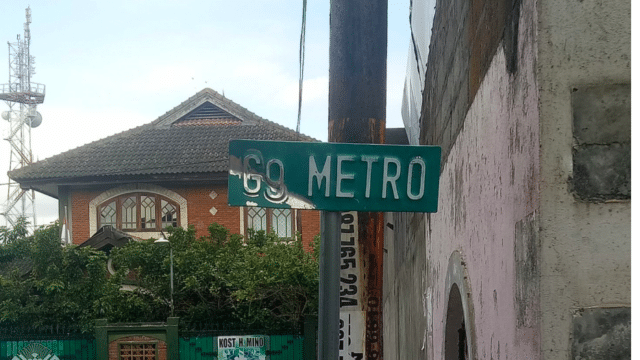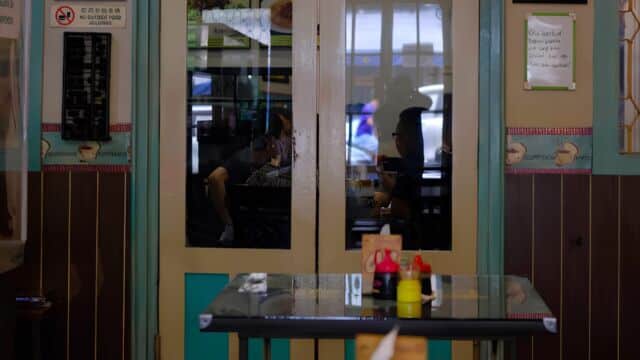Why I Walk With My Eyes Cast Down In Jatinangor
Photo: Achirul Arif Setyawan for This Is Southeast Asia
A roadside | 2,000 words | Translated from Bahasa Indonesia by Dan Benjamin
In my four years as a college student in Jatinangor, a small city just outside Bandung, West Java, I shied away from looking straight ahead of me when out and about. When walking, I assumed a hunched, bowed posture and I kept my eyes fixed on the ground, looking up just often enough to avoid crashing into anything. Not without cause, naturally. I had several reasons for walking this way.
First, the state of Jatinangor’s sidewalks will test even the most agile of walkers. Sidewalks here can look like lego blocks, sometimes piled up, sometimes cleared away totally to smooth the entrance to some building. Both obligate any pedestrian to tread carefully, to side-step, sometimes to leave the sidewalk totally. Sometimes in the very middle of sidewalks are perfectly square-shaped holes: one single pavement stone, neatly-excised. The full extent of possible consequences I have witnessed firsthand. One sunny morning I was walking toward the campus of Padjadjaran University on the sidewalk opposite the Old Gate when I saw a small child disappear into one of these hole. Ever since, I’ve been frightened of falling myself. So I spend a lot of time looking down.
Apart from the uneven, potholed terrain, the second thing that makes me angle my gaze downwards is that I’m scared my neck will get sliced-up by roving kite-strings. In Jatinangor like in Indonesia generally, narrow streets and alleys – often only one or two metres wide – are places where very different interests are pressed together, and where they fight for space. Often I will see traffic in some narrow laneway brought to a total stop if two cars meet going opposite directions. There’s no adequate gap between the road and the buildings on either side. In Jatinangor, to the left and right of many alleyways are eternally-ongoing construction projects for new kost accomodation for students, gradually taking away all the spaces where local kids used to play. Kite-playing is a common pastime among kids here, but limitations on where they can go to do it force them onto the roads, so much so that kite-strings dangling from electricity poles are a common part of the scenery. I’m always afraid one of these strings will cut into my throat, especially if I see kids having one of their kite-flying contests.
The claustrophic laneways also force interactions which are often unpleasant, and this is a third reason – and the most immediately pressing one – why I walk this way. Moving through streets or alleys that are so narrow and crowded brings with it a possibility of close encounters with men – worse if they’re in a group. And they enjoy very much to provide discordant commentary, without permission. Like about where I might be going, or my way of walking which apparently is too masculine. My posture’s too upright, they say, and my pace too fast.
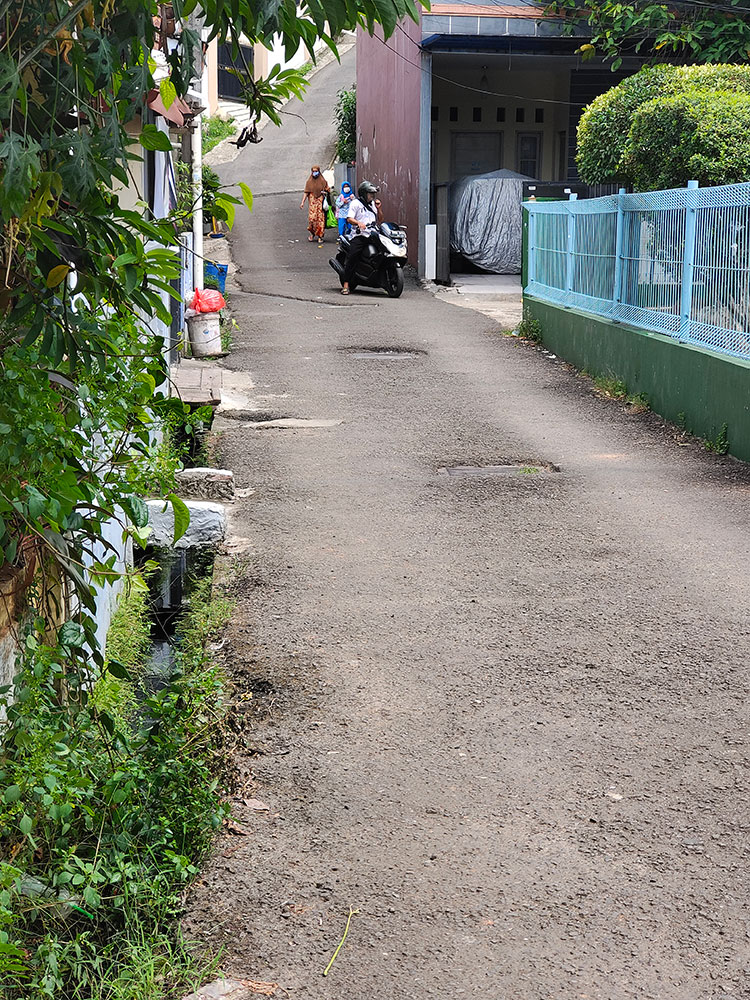
‘Where you off to Neng? Looks like you’re in a rush.’ In the Sundanese language dominant in this part of Java, ‘Neng’ means young woman.
‘Geulis-geulis, but she walks like she’s in the army’. In Sundanese ‘geulis’ means pretty.
‘Moves like she’s going off to war’.
These sort of remarks make me reluctant to walk as I normally would, freely and easily, gazing straight ahead. As much as possible, I avoid meeting the gaze of anyone at all on the streets I traverse. Yet this habit of averting my gaze led me recently to a crucial misunderstanding, one that still makes me wince.
***
Covid-19 was convulsing the world. I had just officially become unemployed after finishing my final graduating exams and leaving behind college life. The exams were all online – my friends appeared as two-dimensional figures on my laptop screen. With no chance to say goodbye and hug my college friends, all my imaginings about post-exam euphoria faded to nothing. Yes, there was a feeling of relief in my chest, but an empty feeling as well – and an anxious feeling. Uncertainty about the future became a haunting ghost, all amid the ongoing pandemic. The shift from a status of ‘university student’ to ‘idle’ was rapid and unsettling.
Though most students were choosing, or forced, to return to their hometowns, I stayed on in Jatinangor because my relations with my family were, at that particular time, not so great. Anyone who has complex relations with their families might understand how I felt. No doubt it was much better to go home to the family nest, with a guaranteed roof over your head and food on the table every day – but all that abundance would have been rewarded with worsening mental health. So, I arrived at a strategy to get by. I moved to cheaper accomodation, in a different area of Jatinangor, and became diligent about cooking to lower food costs.
Jatinangor in the pandemic was like a dead city. The silence felt like a beast which had us gripped in its talons. Much of Jatinangor’s population are students who come from elsewhere in Indonesia. All the city’s amenities give the impression of being centred on accomodating students’ needs: dorms, cheap restaurants, cafes to hang out and do assignments in. Now, those businesses one by one began to shutter. After the start of the Indonesian government’s Pembatasan Sosial Berskala Besar (like a lockdown, but without any useful aid and assistance provided to people), I was constantly asked by local business-owners – ‘When will the students be back?’ Their perilous lack of trade compelled the question. Until today, if I get asked this, I can only smile ruefully and say – I don’t know.
Though I was anxious about the virus, I also felt a need to see other human beings in my new boarding-house. It was like I wanted confirmation that I was still here. So I started spending time in the communal kitchen, while keeping my distance if other residents were present. Simultaneously, I searched for the closest local shops to my new digs so I could buy and cook vegetables to save money.
One day, without GoogleMaps, I just walked along, following my nose. I passed two men and a group of small children playing with bikes in the heat of mid-afternoon. Beneath the sun’s fierceness, I cast my eyes down as usual. Thankfully the men, sitting on the terrace of a house, were indifferent to me, busily discussing something, exactly what I couldn’t hope to guess.
Finally, I saw a warung – a small shop for essential goods – on the left-side of an alleyway, maybe 200 metres from my lodgings. It was a cube-shaped structure grafted onto the front of its owners’ house, as is common in Indonesia. Its front was all but scraping the opposite house’s front fence, the encroachment into alley-space so severe that no more than a single motorbike would be able to scrape through. Immediately nextdoor was a salon, which I presumed – unthinkingly – had the same owner. It was empty of visitors.
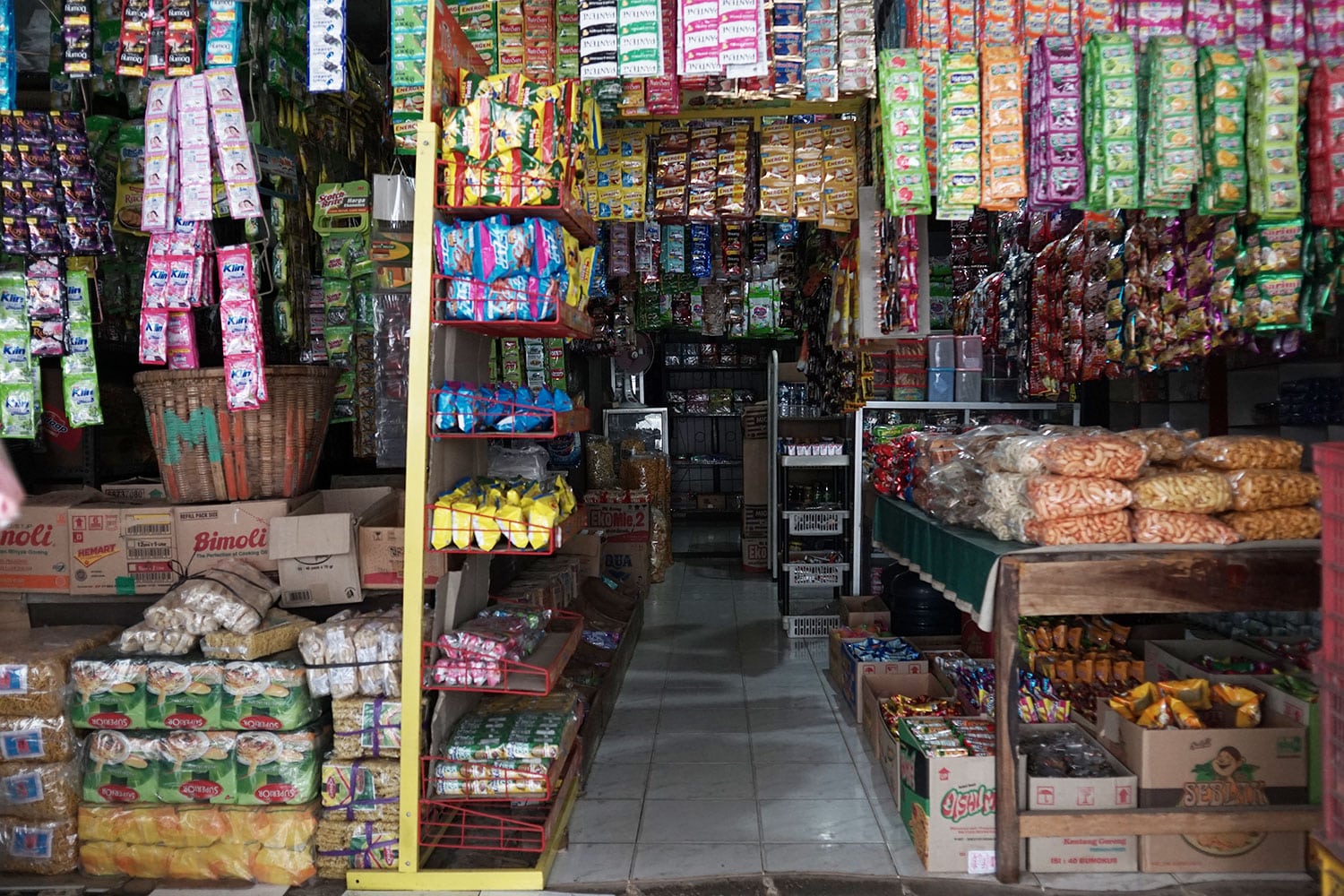
I gave the warung a quick look, casting my gaze to a wooden shelf at the front displaying vegetables and greens plus other foodstuffs. I appraised what looked fresh. There wasn’t much. The carrots, cucumbers, spinach and tomatoes were withered. As I finally saw some green beans that looked passable, I heard sandal-clad footfalls from inside the house, then the shopkeeper appeared.
‘What are you after?’
Still with my eyes cast down, not looking at the person at all, I heard a deep, gruff voice, then said, ‘I’ll get two packs of green beans please, Pak’ – Pak being equivalent to Sir or Mister.
Seconds passed; a silence settled over us. I knew something was wrong. I finally looked up, fixed my gaze on the shopkeeper.
The first thing I noticed was hair – long and dyed peroxide-blonde, very straight, with the obvious aid of a hair-curler. The shopkeeper was wearing jeans shorts and a tight bright pink T-shirt. I caught my breath. I thought: I have made a mistake.
The shopkeeper’s gender identity had been obvious, visible – but I had failed to see it because I hadn’t looked before speaking. Even though the waria (a combination of the Bahasa Indonesia words wanita, woman, and pria, man) are a far from unusual presence in both Jatinangor and Indonesia generally: the tradition of waria and fluid gender identities goes back hundreds of years. I had encountered waria regularly at college – sitting with my friends, we would see them as they went around the cafes begging. All this being said, I imagined that today was not the first time the shopkeeper had faced such a misunderstanding.
‘That’ll be five thousand rupiah. Is there anything else you want’. Said with curtness. Sounding less a question than a lament.
I looked at the shopkeeper’s face, studied the facial expression. Sad rather than annoyed, I thought. I wanted to cry: I cursed myself. For four years I was at the Faculty of Cultural Studies, studying gender theory and the humanities generally, all of which, essentially – theoretically – had been teaching me how to mix and to get on and to capably interact with the diversity of human society around me. Yet here now in the real world, I felt stilted, apparently unable even to accurately select from the simple set of words used as greetings for people of different genders.
The shopkeeper disappeared back into the house, then re-entered the shop, now wearing a mask. I don’t know quite how, but I gleaned immediately that putting on the mask was not about the virus. The shopkeeper wanted to step back from me, to withdraw from me. Even though much of the shopkeeper’s face was now covered, the eyes remained visible to me, and I saw that they looked exhausted, although the precise feelings that lay underneath I could not presume to guess.
***
Feeling uncomfortable had made me cast my eyes downwards, made me suspicious of the streets, made me avoid peoples’ gazes. Perhaps, I thought, all those things had made me fundamentally ill at ease in the world around me, to such an extent that I had now misread this shopkeeper so dramatically.
Jatinangor should be a safe place for both visiting students and locals to meet and interact. After the fall of the New Order regime of Suharto, Jatinangor was much-hyped as a site that would be redesigned to create people-friendly public spaces. The planning process was open and inclusive, involving local people, university students, activists and business interests: all those disparate voices were enfolded inside one organisation, the Jatinangor Forum. It was hoped that through such a body, urban planning for Jatinangor could accommodate the wishes of everyone, very different to before, when policy had always been imposed from above.
Like other Reformasi (Reform Era) projects, this plan for the democratization of public space ended in failure. For Jatinangor, reform of spatial planning was much-discussed, but never-implemented. The replacement of a key local politician wounded the process; fatal was the regional parliament’s stalling. Remnants of the New Order lived on in the thinking of officials and politicians, who arbitrarily overruled what the forum had agreed to. People became pessimistic, participation levels plummeted. It was over before it had begun.
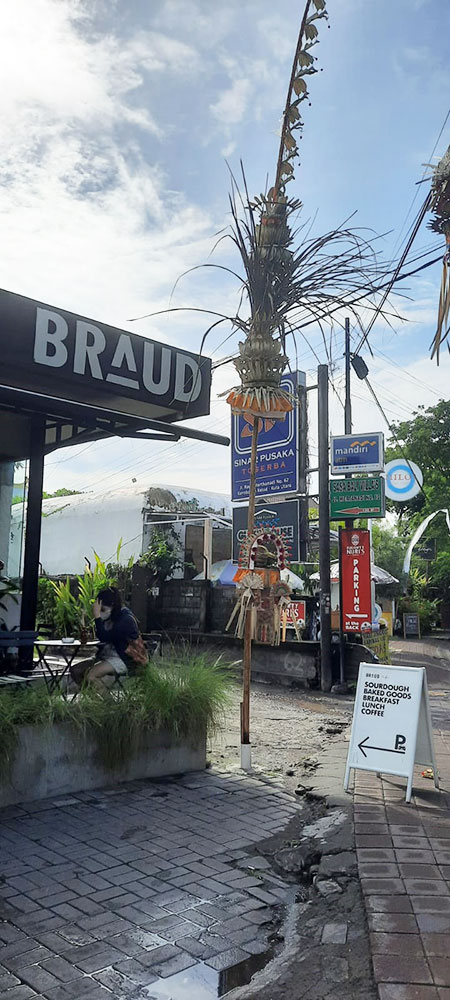
The failure of the urban planning reforms I felt every day I lived in Jatinangor as a student. The reality of the city as a place where people of different backgrounds meet – different ethnicities, classes, religions, cultures, and gender identities – was not matched by spatial planning to accommodate that diversity. Instead of building public squares for people to gather, footbridges for pedestrians to safely cross busy roads, or facilities as basic as adequate sidewalks, the physical development of Jatinangor that did occur created an even starker sense of separation between visiting students and locals (the former mock the latter by abbreviating ‘warga lokal’, a phrase meaning local citizens, to ‘warlok’), other groups, and the place where they all live. This city accommodates diversity, but it fails to ensure the dialogue that leads to understanding and empathy.
Such a lack of dialogue and empathy has meant less resistance to the strengthening of religious-conservative agendas and intolerance – including intolerance for the waria. A fatwa was pronounced on the waria and queer community by the Indonesian Ulama Council in 2014. Simultaneously at the community level, derogatory words to refer to the waria – ‘bencong’ or ‘banci’, insulting their appearance – have become more common, and an idea began to circulate too, who knows from where, that the waria are dangerous, that if you refuse to give them money they get violent.
After seeing the shopkeeper’s disappointment, I couldn’t stop thinking about how separated I had become from my surrounding environment in Jatinangor, even though I’d lived there four years. I couldn’t get over that, in this instance, I had caused the shopkeeper’s discomfort.
***
I thought fast; and I went about trying to repair my first attempt at a greeting.
‘Um, hey, how much for the tempe… kak?’ Kak in Indonesian is a much more neutral term of address, and not gender-specific.
A second passed. I could feel the shopkeeper’s renewed attention, as a pause lengthened, although I still kept my eyes on the ground as I waited.
‘Five thousand for the long ones, two for the short ones’.
‘Okay, just the short ones then, kak’.
‘Anything else?’
‘Um… yes, I’ll get one satchel of soy sauce. Just one is fine kak.’
The shopkeeperng put it all in a plastic bag for me; glanced at me; and then the mask was lowered slightly.
‘That comes to seven thousand five hundred rupiah’.
I handed over precisely the right money.
‘Thanks kak’, I said.
‘Thankyou’. The tone now was soft, and I noticed an elongation in the final vowel. Hearing that rhythm in the voice, so distinct to this region of Indonesia, I instantly remembered a friend of mine, a born and bred Sundanese girl, who is a champion at singing iconic Sundanese songs. I glanced at the seamlessly-applied purple lipstick on the shopkeeper’s lips.
As I was starting to walk back to my boarding-house, I heard the voice of a middle-aged woman, seemingly a neighbour, addressing the shopkeeper:
‘Ateu! Still got any tempe?’
I slowed down my pace to eavesdrop on the shopkeeper’s answer. Ateu in Sundanese means auntie.
‘Yep. Still got two’, I heard, in a voice that sounded far happier.
After I arrived back at my dorm, I made a promise to myself. In future, if I shopped again at that warung, I would not shy away from asking if the shopkeeper would prefer to be called ‘ateu’. Jatinangor itself might be incapable of being a safe place. But I do not intend to worsen things.
© Trisha Adelia
English translation © Dan Benjamin




